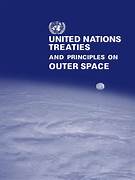On October 10, 1967, a historic event took place that would shape the future of space exploration and govern the activities of nations in outer space. It was on this day that the Outer Space Treaty, also known as the Treaty on Principles Governing the Activities of States in the Exploration and Use of Outer Space, including the Moon and Other Celestial Bodies, was opened for signature.
The Outer Space Treaty was a significant step in international cooperation and the peaceful exploration of space. It was the result of several years of negotiations among the United Nations member states and aimed to prevent the militarization of space and ensure the responsible and peaceful use of outer space for the benefit of all humanity.
The treaty established a framework of principles that govern the activities of states in outer space. It affirmed that outer space, including the Moon and other celestial bodies, is not subject to national appropriation, meaning that no nation can claim ownership of celestial bodies or any part of outer space. This principle laid the foundation for the idea that space is a shared resource for the benefit of all nations.
Another crucial aspect of the Outer Space Treaty is its prohibition of the placement of nuclear weapons or other weapons of mass destruction in outer space. This provision aimed to prevent an arms race in space and ensure the peaceful exploration and use of outer space. It also prohibited the establishment of military bases, installations, and fortifications on celestial bodies, further emphasizing the commitment to peaceful activities in space.
The treaty also emphasized the importance of international cooperation in space exploration. It called for the free exchange of information and scientific discoveries, as well as the sharing of benefits derived from space activities. This provision paved the way for collaborative efforts among nations in space exploration and the sharing of knowledge and resources.
Furthermore, the Outer Space Treaty established the principle of liability for damage caused by space objects. It held states responsible for any damage caused by their space activities, whether it be to other states or to the environment. This provision aimed to ensure that space activities are conducted safely and responsibly, taking into account the potential risks and consequences.
Over the years, the Outer Space Treaty has been widely ratified, with more than 100 countries becoming parties to the treaty. It has served as a cornerstone of international space law and has guided the activities of nations in outer space for over five decades.
However, as technology has advanced and new challenges have emerged, there have been calls for updating and expanding the provisions of the Outer Space Treaty. Issues such as space debris, the exploitation of space resources, and the commercialization of space activities present new challenges that require careful consideration and international cooperation.






